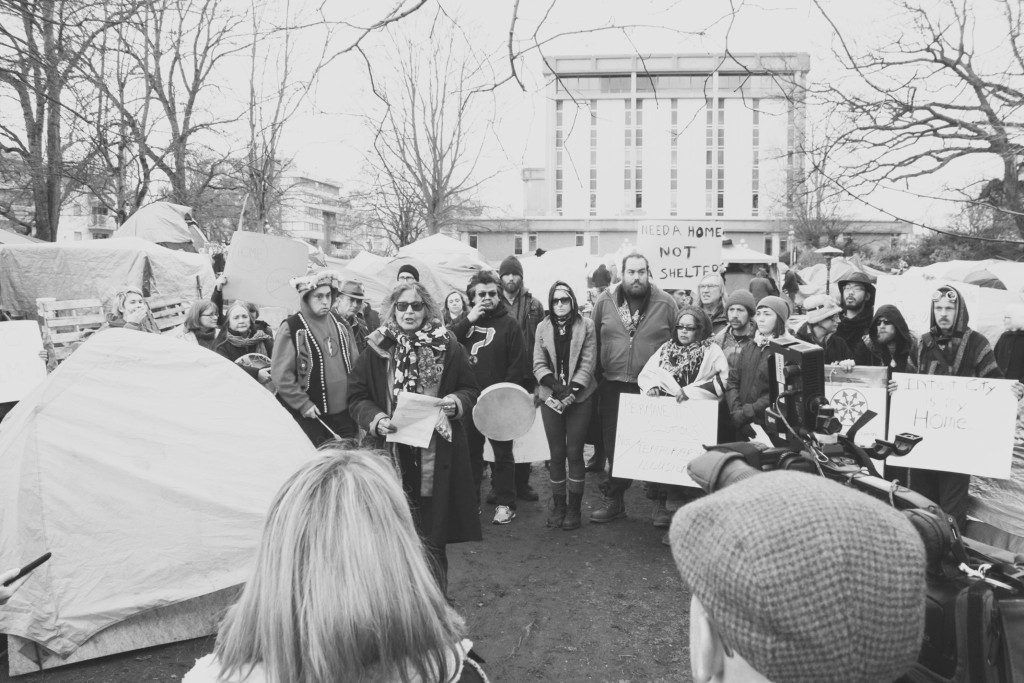
Liberation & Decolonization – Discussion groups change our hearts and minds
 During our summit gathering communities across southern B.C., we decided that “liberation & decolonization” was a major point of unity among our many groups. As communities facing violence, homelessness and poverty in our everyday lives, we fight back by existing. We also fight back in the streets in organized resistance to police brutality and criminalization. But we must also fight for our hearts and minds at the same time. In a settler society, we must all work to decolonize our ways of being and living. This means acknowledging and confronting the ways we have learned to internalize the forces of oppression that affect us and others in our communities. Confronting the ways that capitalism and colonialism get inside our hearts and minds takes commitment and courage.
During our summit gathering communities across southern B.C., we decided that “liberation & decolonization” was a major point of unity among our many groups. As communities facing violence, homelessness and poverty in our everyday lives, we fight back by existing. We also fight back in the streets in organized resistance to police brutality and criminalization. But we must also fight for our hearts and minds at the same time. In a settler society, we must all work to decolonize our ways of being and living. This means acknowledging and confronting the ways we have learned to internalize the forces of oppression that affect us and others in our communities. Confronting the ways that capitalism and colonialism get inside our hearts and minds takes commitment and courage.
One of the ways we decided to implement “liberation & decolonization” is through reading and discussion groups. Reading and discussion groups can be crucial spaces to share ideas, learn from others, and be exposed to new information and histories. In these groups, we can express our beliefs and politics vocally while listening to other participants reflect on their own positions.
Learning is something that we do throughout our daily lives. But in a colonized and capitalist society, many of our experiences reflect violent and oppressive conditions that are not of our own choosing. We learn to fear each other, to compete with each other for daily needs, and we learn to embody systems of oppression. In our communities here in British Columbia, this means that all of us, whether we are Indigenous, racialized, or white, learn to embody the violence that settler society is founded upon.
For example, the theme of a reading series Alliance Against Displacement ran in the fall was on the connections between displacement and dispossession. We decided on this topic because the forces of displacement (capitalism) are interwoven with the forces of dispossession (colonialism). At the summit we discussed the tensions between anti-colonial and anti-displacement, anti-poverty movements, but in our two-day meeting we could only scratch the surface. No matter who we are, as people living in British Columbia in the 21st century, our personal and social lives are formed in the context of capitalism and colonialism. Our relationships to these forces vary, and with discussions focused on readings and history we can disentangle our different relationships to power. We can also discover some of the ways we stand in solidarity with each other – even as our classed, raced, and gendered positions also mean that we bring different relationships and different struggles to the table.
We don’t choose to embody settler colonialism; it is something we are born into. And yet, we can choose to unlearn forms of oppression that all of us enact towards others in our daily lives.
This is why reading and discussion groups are so useful. Spending time together reflecting on our history helps us understand why we have had certain experiences. And it also helps us develop ways of combatting internalized oppressions so that we can build strong organizations from the inside out. Changing our hearts and minds requires work on the most intimate terrains of struggle, and we believe these terrains are revolutionary in their potential to make us anew.
